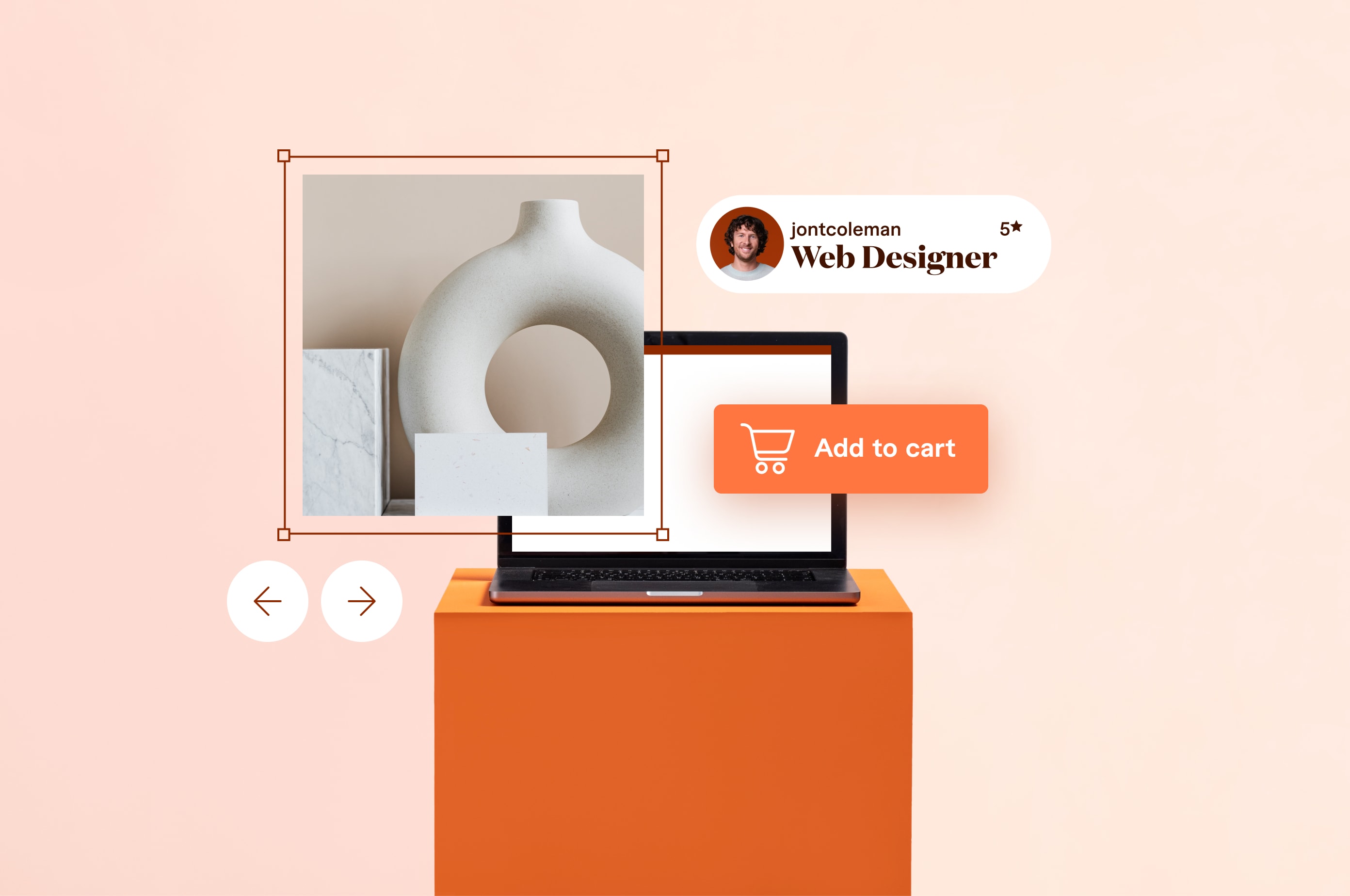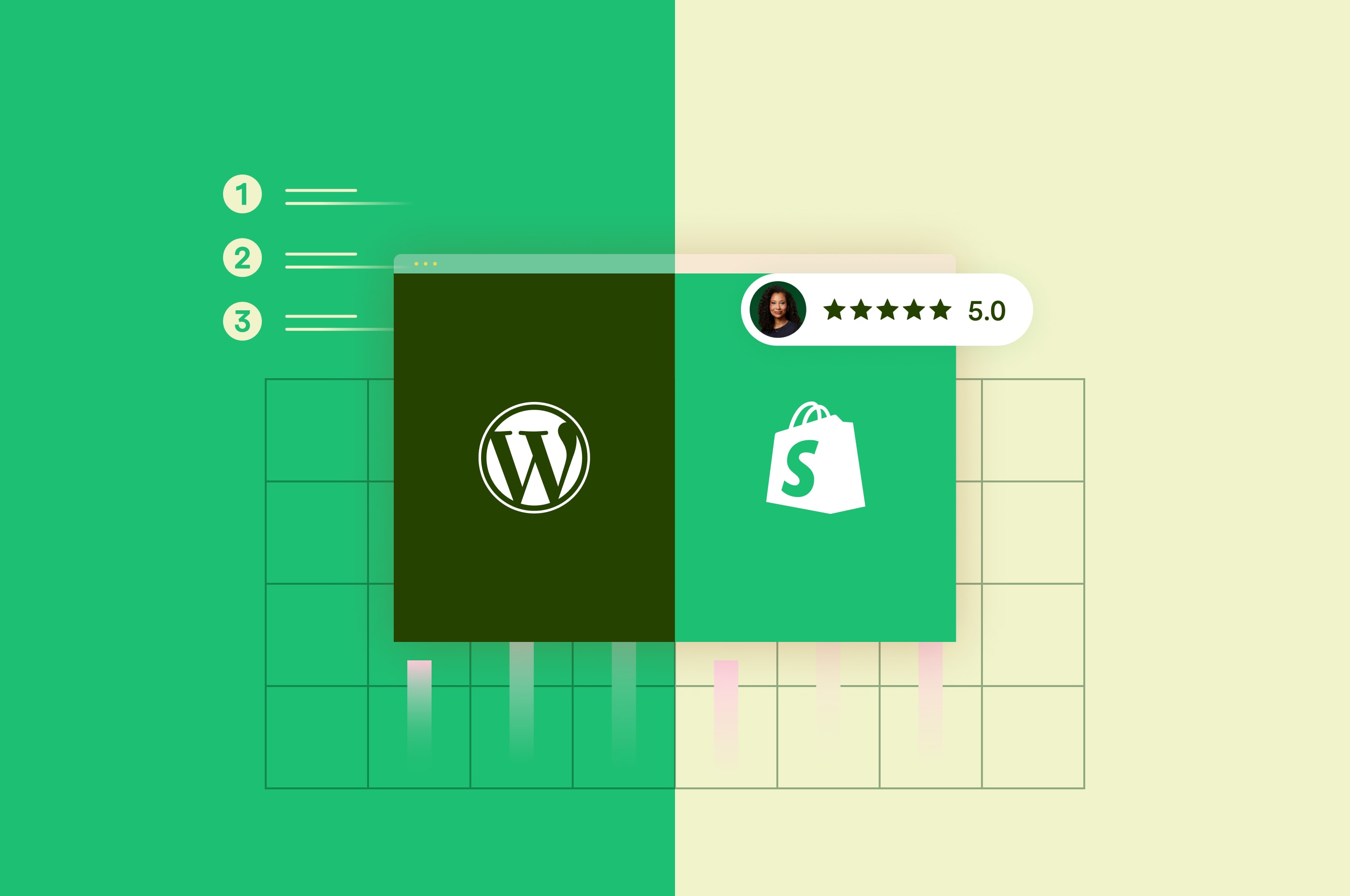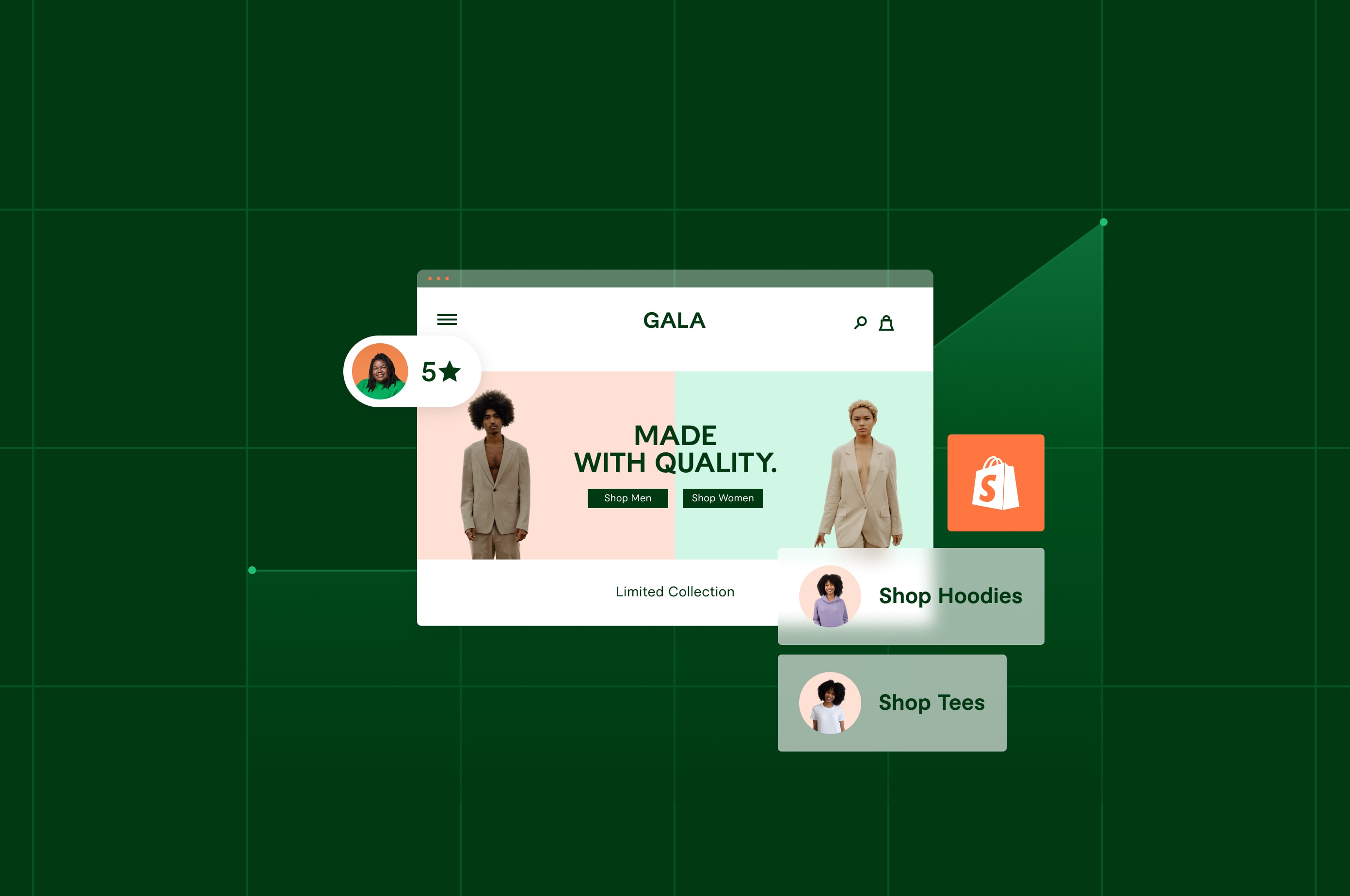How to Build an Ecommerce Store Fast with a Shopify Developer in 2024
Make your online store a reality with the help of a Shopify developer. Learn what to look for and where to find one.
 November 4, 2023
November 4, 2023 7 minute reading
7 minute reading
In today’s increasingly digital world, the most lucrative small businesses tend to have an online presence. It’s predicted that by 2027, nearly a quarter of all retail sales will take place online. Ecommerce platforms like Shopify make it easier than ever to launch a digital storefront, and with the help of a Shopify developer, you can make that idea a reality in no time.
What is a Shopify developer?
A Shopify developer has specialized knowledge and experience creating and customizing online stores using the Shopify platform. They understand the complexities of web development, design, and marketing, and have an intimate knowledge of the Shopify platform. Shopify developers usually are also skilled in front-end development and optimizing the user experience (UX). These qualities make them great assets for small business owners looking to build a fully functional online store that meets their specific needs and requirements. Now, we’ll dive into the different types of Shopify developers, as well as the logistics of onboarding one.
What do different types of Shopify developers do?
There’s no one-size-fits-all description for a Shopify developer because each person is usually specialized in a specific area of ecommerce development. Depending on your needs, you may need to hire multiple types of Shopify experts, or just one.
Shopify web design and development
Most ecommerce business owners aren’t fluent in code, which is a critical skill to have when developing an ecommerce website. Shopify web designers and developers typically possess a wealth of development skills and knowledge when it comes to programming languages, such as:
HTML5
CSS3
JavaScript
PHP
Python
Ruby
React
These types of developers also make sure that your website looks professional and functional on all devices by optimizing it for mobile responsiveness. This is one of the most common types of developers that new store owners are looking for.
Shopify app development
Having a custom app for your business can put you at a great advantage over your competitors. App developers are those who specialize in creating custom applications for the Shopify App Store. If you hire a developer for this role, ensure they have an extensive knowledge of API development, since they’ll be working closely with APIs when connecting different pieces of software together.
Shopify SEO services
There are plenty of ecommerce SEO mistakes to avoid when developing your website, and a Shopify SEO expert makes sure your technical SEO is optimized. These developers understand how certain elements affect the overall conversion rate, such as checkout pages and product images or descriptions. Your online store’s user experience is critical, as it allows customers to easily find what they’re looking for. It’s also important that search engines properly recognize your Shopify ecommerce store, so potential customers can discover it through organic search results.
Shopify theme development
A strong brand can make or break the success of your online store. Incorporate branding elements and messaging into your Shopify storefront with the help of theme developers. While Shopify provides many free templates to choose from, a developer can create a custom theme to match the vision you have for your business so that your site stands out as its own custom Shopify store.
Shopify migration services
Don’t stress if you initially launched your store on Magento, Woocommerce, BigCommerce, or elsewhere. Shopify developers are also specialized in migrating content from different ecommerce platforms to Shopify. Manually importing already existing products and data is time-consuming. Streamline that workflow by partnering with a Shopify developer who can replicate your old site on the Shopify platform.
Shopify third-party integration services
While Shopify comes with tons of functionality and features, some store owners want to integrate third-party software and applications. There are many integrations to consider—which a Shopify developer can do for you—including:
Marketing tools. Add email marketing tools like Klaviyo or Mailchimp to create custom marketing campaigns easily.
Social media. Expand your reach by selling products directly from Instagram or Facebook—and keep track of everything on Shopify.
Online marketplaces. If you want to make sales on Amazon, eBay, or other marketplaces, you’ll need a developer to integrate these with Shopify.
Inventory management. Inventory management tools can greatly increase your organization, keeping track of customer orders and accounting.
Shopify maintenance services
The work doesn’t end when your store goes live, in fact, it becomes even more tedious. Website development requires constant attention to address bugs and add new updates. If your store requires back-end maintenance, a Shopify developer can address any issues, as well as make sure your security standards are all up-to-date.
How much do Shopify developers cost?
Since Shopify developers can perform a variety of services, the cost varies greatly. Experience, location, and scope of the project all affect the final price point. Simple projects, such as creating a new Shopify store, will be on the lower end. More complex projects that involve developing custom themes or integrating third-party applications will require a higher budget. The cost also depends on whether you’re building a store from scratch or already have some elements pre-made.
When budgeting for your project, it’s important to factor in any ongoing maintenance or support costs that may occur in order to ensure that your ecommerce store runs smoothly and efficiently. These costs can vary depending on how many updates are needed over time or if you need help troubleshooting any issues that arise.
Benefits of hiring a Shopify developer
Your online storefront is one of the most important aspects of your ecommerce business, meaning website design isn’t an area where you should take any shortcuts. Investing in development services to build your ecommerce store can be a great way to get your shop up and running quickly and efficiently.
Some key benefits of hiring a Shopify developer include:
Specialized services. Why learn something as complex as Shopify design when you can hire a professional who’s well-versed in the platform? Developers familiar with the platform come equipped with knowledge in Shopify Liquid code, the features of the platform, and how to best optimize customer experience.
Customization. Most business owners could figure out how to start an ecommerce business on Shopify in 2023, but many would struggle personalizing the site. Luckily, you can work with developers to implement your own branding and install third-party features, like an AI-powered chatbot.
Recommendations. Shopify developers keep up with the latest trends in ecommerce, and can provide their expert input when necessary. Whether it be about dropshipping, integrating payment gateways, or when to level up to Shopify Plus, developers are armed with relevant industry insights.
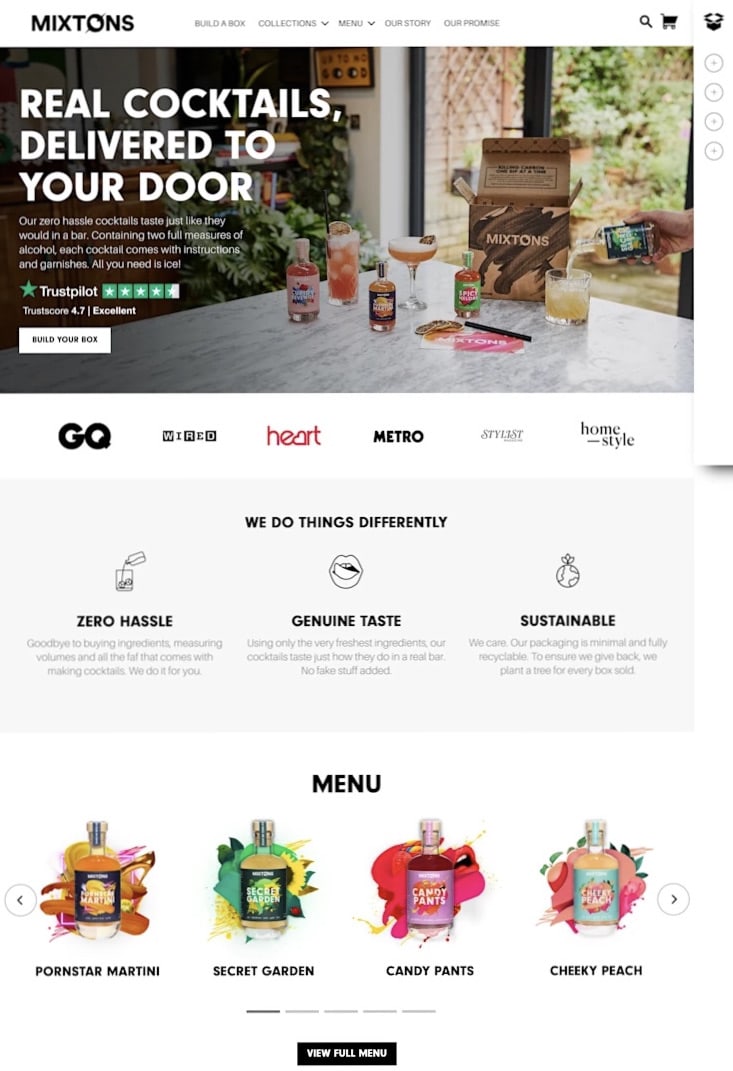
Custom Shopify website created by Fiverr freelancer Create Circus.
Tips for optimizing your Shopify website for maximum return
Launching a successful ecommerce store requires careful planning and expert execution. If you’ve only had experience with physical stores, you’ll need to adjust your approach as you look to launch an online storefront. Working with an experienced Shopify developer can help in the optimization of your store, but it requires a roadmap. Follow these six steps when creating a brand new store on Shopify for the first time.
1. Find and hire a skilled Shopify developer
Before the process can begin, you need to determine how many developers are needed for your project. Is it a completely new store, or are you migrating over elements from a previous site? Do you want to work with several specialists, or one generalist to bring your store’s vision to life? Check out Fiverr to find a developer to build your Shopify site.
2. Collaborate with developers to create the store’s structure
How do you want your site to be organized—in a hierarchical or a flat structure? The answer will depend on how you wish to link relevant products together and organize your site menu. Developers can help you come to a decision based on the information you provide them.

Depiction of a flat site structure versus a hierarchical site structure.
3. Customize the store’s design and layout
Take a look at these 10 stunning ecommerce website examples to get some inspiration on how you want your store to look. Turn your design vision into a reality by budgeting for a custom theme. You can base the look of your store off others on the Shopify platform, or bring an original vision to life with the help of a developer.
4. Integrate essential ecommerce features and plug-ins
Decide which third-party tools and software you’d like to use to take your store to the next level—whether that means expanding your product offerings, improving your customer experience, or just making your life easier. Which tools are currently in your wheelhouse? You don’t need to invest in a bunch of new software—just ask a developer to integrate your favorite apps or plug-ins to the Shopify platform for you.
5. Ensure the store is mobile-responsive and user-friendly
Before you’re ready to share your store with the world, make sure it’s cross-platform friendly. Mobile makes up 60% of all global ecommerce sales. If your store isn’t mobile-friendly, you’re missing out on a huge portion of your target audience. Always check how your store looks on both mobile and desktop before making any new changes.
6. Analyze and optimize the store’s performance
Google analytics is an ecommerce business owner’s best friend, and the new GA4 for ecommerce makes tracking your store’s traffic easy. Continually monitor your store’s analytics to see where you can enlist a developer to make the necessary adjustments and upgrades. You can even hire a developer to make sense of your analytics for you, and recommend room for improvement.
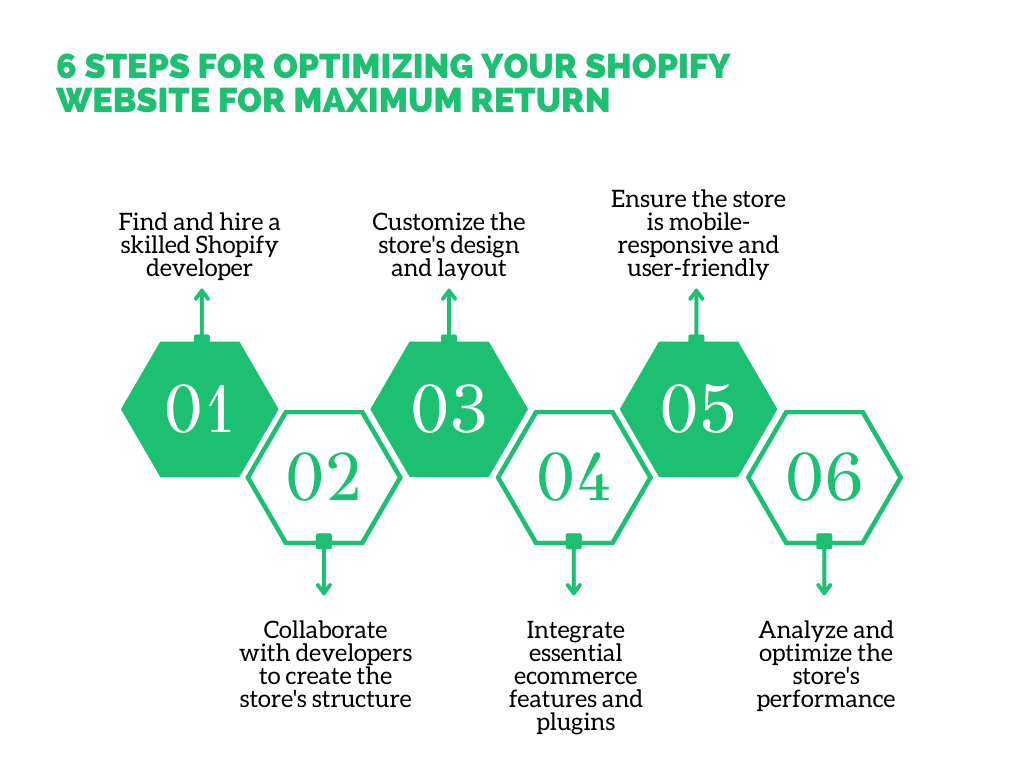
Flowchart illustrating six steps to optimize your Shopify website for maximum return.
How to find the right Shopify developer
As you would when hiring any full-time employee, take your time when looking to onboard a Shopify developer. There are many factors to take into account—and though budget is important when looking, remember that you get what you pay for. Often, going with the cheapest developer results in lower quality work, so take a more holistic approach when vetting candidates.
Portfolio
It’s important to hire a Shopify developer that has proven experience in the field you need help with. Scan the portfolios of your favorite candidates. If you can point to their previous work as a guideline for how you want your store to function, then the odds of them making something up to your standards are greatly increased.
Testimonials
Check out what previous clients have to say about Shopify developers. This gives you some much-needed insight into their communication styles, their reliability, and their flexibility. It’s particularly helpful if you can find testimonials from clients who have received similar services to what you’re looking for.
Technical expertise
Depending on the type of Shopify developer you’re looking to hire, they’ll need varying degrees of expertise. Figure out exactly what you’re looking for before you start your search to make narrowing the candidate pool easier. At a minimum, a Shopify developer should have the technical basics covered, such as HTML, CSS, and Javascript. Offering paid test assignments is one way to figure out a potential developer’s experience and knowledge.
Where to find a Shopify developer to optimize your store
Shopify makes it possible for you to develop your own storefront—they even have the Shopify Partner Academy so you can learn how to work with the various Shopify tools or a ShopifyDevs YouTube channel showcasing tutorials and best practices. But many business owners don’t have the extra time to learn a new set of skills. There’s no shortage of web developers—more than 27.7 million exist worldwide. As the market gets more saturated, finding a trustworthy Shopify developer can be difficult.
Join Fiverr to access a marketplace of freelance developers that can build your Shopify storefront, optimize it for ecommerce SEO, and personalize the branding to your liking.
